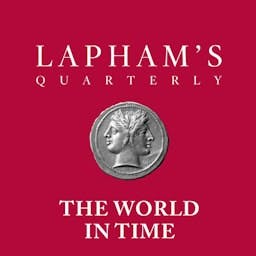

The World in Time / Lapham’s Quarterly
Lapham’s Quarterly
Donovan Hohn, the acting editor of Lapham's Quarterly, interviews historians, writers, and journalists about books that bring voices from the past up to the microphone of the present. New episodes are released weekly.
Episodes
Mentioned books

Sep 28, 2018 • 53min
Episode 34: David Levering Lewis
Lewis H. Lapham talks with David Levering Lewis, author of “The Improbable Wendell Willkie: The Businessman Who Saved the Republican Party and His Country, and Conceived a New World Order.”

Aug 31, 2018 • 39min
Episode 33: Jim Holt
Lewis H. Lapham talks with Jim Holt, author of “When Einstein Walked with Gödel: Excursions to the Edge of Thought.”

Jul 27, 2018 • 40min
Episode 32: Steven Ujifusa
Lewis H. Lapham talks with Steven Ujifusa, author of “Barons of the Sea: And Their Race to Build the World’s Fastest Clipper Ship.”

Jul 13, 2018 • 57min
Episode 31: Roland Philipps
Episode 31: Roland Philipps by Lapham’s Quarterly

Jun 29, 2018 • 36min
Episode 30: Catherine Nixey
Lewis H. Lapham talks with Catherine Nixey, author of “The Darkening Age: The Christian Destruction of the Classical World.”
Thanks to our generous donors. Lead support for this podcast has been provided by Elizabeth “Lisette” Prince. Additional support was provided by James J. “Jimmy” Coleman Jr.

Jun 15, 2018 • 35min
Episode 29: Steve Fraser
One of America’s most enduring myths involves the fledging country’s supposed fortitude in refusing to import the class structures of its forebears. But, historian Steve Fraser says in the latest episode of The World in Time, “right now, it’s becoming increasingly difficult to sustain that delusion.” Or, as he puts it at the beginning of his book Class Matters: The Strange Career of an American Delusion, “Class is the secret of the American experience, its past, present, and likely future. It is a secret known to all, but a source of public embarrassment to acknowledge. It lives on all the surfaces of daily life, yet is driven underground every time its naked self offends cherished illusions about how we deal with each other.”
Lewis H. Lapham talks with Steve Fraser, author of Class Matters: The Strange Career of an American Delusion.

Jun 1, 2018 • 28min
Episode 28: Stephen Greenblatt
Episode 28: Stephen Greenblatt by Lapham’s Quarterly

May 18, 2018 • 30min
Episode 27: Barbara Ehrenreich
Barbara Ehrenreich thought there was something strange going on with the smart middle-aged people she knew. They seemed to be obsessed with their bodies in a novel and unexpected way, exercising frequently, assessing the value of every bite they considered, and obeying every preventive measure offered by doctors. “I did not share this obsession, I will admit,” she says on this episode of The World in Time. Annual visits to the doctor, constant medical tests—it all felt futile, or at least unnecessary. “It's in my nature to question everything,” she explains, “so in each case…I would do some research, and see if this indeed did any good.” Her new book, Natural Causes: An Epidemic of Wellness, the Certainty of Dying, and Killing Ourselves to Live Longer, is a result of that research, and she discussed her findings, scientific and philosophical and cultural, with Lewis Lapham. And yes, Gwyneth Paltrow does come up.
Lewis H. Lapham talks with Barbara Ehrenreich, author of Natural Causes: An Epidemic of Wellness, the Certainty of Dying, and Killing Ourselves to Live Longer.

May 4, 2018 • 35min
Episode 26: Susan Dunn
Lewis H. Lapham talks with Susan Dunn, author of A Blueprint for War: FDR and the Hundred Days That Mobilized America.
Thanks to our generous donors. Lead support for this podcast has been provided by Elizabeth “Lisette” Prince. Additional support was provided by James J. “Jimmy” Coleman Jr.

Apr 20, 2018 • 34min
Episode 25: David Cannadine
“Beyond any doubt the decades from the 1800s to the 1900s witnessed many extraordinary and traumatic challenges and wrenching and disorienting changes,” historian David Cannadine writes in the epilogue of Victorious Century, “as expressed and mediated through (among other things) the poetry of Wordsworth and Tennyson, the paintings of Turner and Landseer, the novels of Dickens and Eliot, and even Gilbert and Sullivan’s comic operas and Oscar Wilde’s brilliantly brittle plays.”
But “how far did the men (and apart from Queen Victoria, they were all men) who were ostensibly in charge of the affairs of the United Kingdom and the British Empire understand what was going on and know what they were doing?” The book chronicles many of these events hurtling by those supposedly orchestrating or managing them, starting in 1800 with Ireland being subsumed into the larger kingdom of Great Britain and ending with the general election in 1906, when the Liberal Party squashed the Conservatives for the last time. In this episode of The World in Time, Cannadine explains why he chose those dates as bookends and why the words of Karl Marx and the oft-quoted beginning of A Tale of Two Cities precede his book.
Lewis H. Lapham talks with David Cannadine, author of Victorious Century: The United Kingdom: 1800-1906.
Thanks to our generous donors. Lead support for this podcast has been provided by Elizabeth “Lisette” Prince. Additional support was provided by James J. “Jimmy” Coleman Jr.


